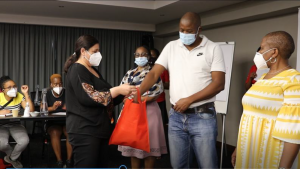The ASCENT South Africa team recently held a successful randomization event which also served as the kick-off of the digital adherence technologies (DAT) project in South Africa. The ASCENT project, implemented by The Aurum Institute in South Africa, aims to help tuberculosis (TB) patients to successfully complete their course of treatment, using DATs and data-driven support interventions, utilizing tools as smart pill boxes.
The randomization event was attended by Dr Jens Levy, Senior Epidemiologist at KNCV Tuberculosis Foundation and Professor Katherine Fielding, Senior Statistician at the London School of Hygiene and Tropical Medicine (LSHTM). They joined other delegates from the Department of Health (DoH) representatives from Gauteng Province, Tshwane District DoH staff, health facility managers, TB nurses and supportive staff from 36 clinics selected to take part in the project.

ASCENT South Africa project manager Nontobeko Ndlovu said the project was well received by the stakeholders who also took the opportunity to raise the struggles they experience in the Tshwane district with loss to follow up of their TB patients. This, they reported, worsened due to the COVID-19 pandemic. “They appreciate and welcome these technologies that will contribute to resolving some of the district’s major challenges,” Ndlovu said.
About the DATs
Technologies included in the project are; a medication sleeve, where the patient receives their TB medication in customized packaging; a smart pill box, where the patient is provided with a specially designed box to store their TB medication; and lastly video supported treatment, where the patient records a video message using a customized app on their phone.
The randomization ceremony
Professor Fielding managed the randomization – a method of assigning health facilities to receive the intervention by chance alone- session with a presentation on the ASCENT trial design which is a pragmatic cluster randomized trial and the rationale for randomization.

Professor Salome Charalambous, Aurum’s Deputy Chief Scientific Officer, led the randomization process. A total of 36 selected facilities were assigned to either the intervention group or the standard of care group. Eighteen facilities were assigned to the intervention group and the remaining eighteen facilities were assigned to the standard of care. Afterwards was determined which of the facilities in the intervention groups would receive the medication box and which ones would get the medication sleeve.
KNCV Tuberculosis Foundation is implementing ASCENT together with The Aurum Institute, London School of Hygiene and Tropical Medicine, and PATH.
